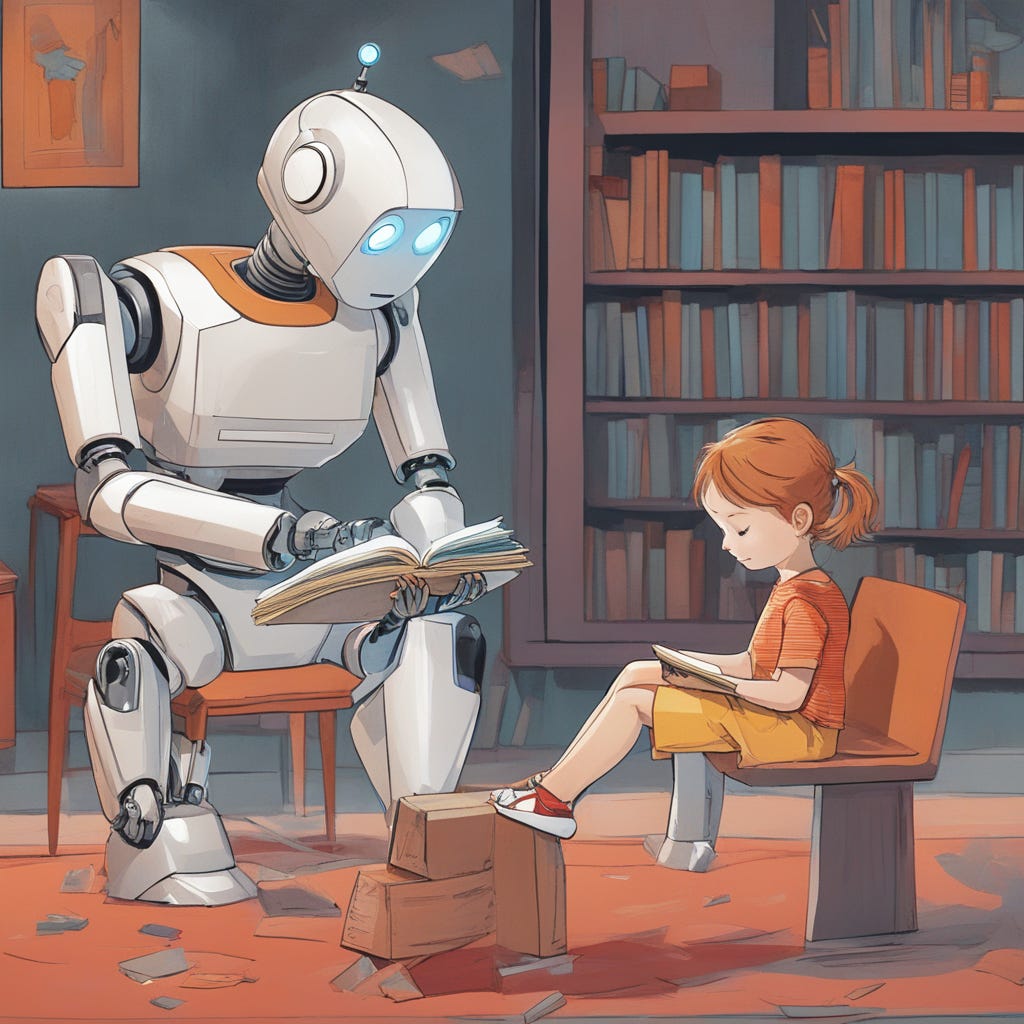AI Reading Assistance: A Revolutionary Tool or a Threat to Close Reading Skills?
A free section from my course about AI reading assistants
Education’s exposure to having particular skills and tasks partially automated by generative AI is extraordinarily high, and I’m not talking about writing. While most educators have been laser-focused on writing generators like ChatGPT and asking what this means for writing and student learning, few have explored how large language models can augment reading. You can upload a PDF and have an LLM analyze it, producing automatic summaries at your reading level. The implications AI reading assistance has for students are immense: those with disabilities, non-native speakers, and those who struggle at reading level can all benefit. But just like writing, adopting generative AI as a reading tool holds many risks—namely, offloading close reading skills and automating the act of reading as just another task.
Why You Should Pay Attention to AI Reading Tools
Microsoft is readying to deploy AI-powered reading assistance in K-12 with Reading & Progress Coach and such tools could be truly revolutionary to help students develop much-needed reading skills. Covid took a horrible toll on reading progress in the US. The NAEP Report Card numbers are grim, only 33% of 4th graders are proficient at reading. These numbers are so low that many will welcome any type of support to improve them.
I piloted two reading assistants this spring, SciSpace and ExplainPaper. Of all the AI tools my first-year students explored, AI reading assistants were by far the most popular and it is easy to see why. Students loved the ability to augment their reading and use the interfaces to explore unfamiliar terms, summarize paragraphs, transform the reading to their reading level, etc. They could take a complex PDF loaded with academic jargon and simplify it in easy-to-understand terms. But what was lost in that act of automated simplification? Sure, this tool could help those with reading issues, but nearly everyone in the class was praising the features because it got them out of, or at least lessened, the burden of close reading.
We talk endlessly, and often in circles, about the perils of generative AI in education and I’m sure AI reading assistance will enter that discourse soon. What I hope isn’t lost in the back and forth is a fundamental question: Is what we assign students to read or write designed to help them learn viewed as a burden or as an opportunity? For this context, I had to ask myself what I would do in their situation, would I have read the assigned material in a deeply analytical way, using this tool to help me when I reached a pain point in my reading process, or simply offload the task to generative AI?
At the end of the experiment, I asked my students what was gained and what was lost in the process. Most students didn’t think they’d lost anything at all, so I asked them what happens when their boss offloads reading a report or email they wrote to AI. What happens when I turn to a reading assistant to help ease the burden of grading papers? One insightful student response from this discussion stuck with me: “I don’t think you’d have had a job for real long if you did that. You’d get fired, right? The schools wouldn’t let that happen. They’d stop it. Businesses, too. They’d all stop it. Somehow, they’d stop it. Right?”
Below is a free module for my Generative AI in Education course about reading assistants. You can explore ways to use it with your students and consider what guardrails to put in place.
Reading Assistance Module
00:00 ExplainPaper: Exploring Reading Assistants
00:25 DEER Framework
01:47 AI-Assistance is like Tracing
02:48 ChatGPT is not Designed as an AI-Assistant
03:55 AI Reading Assistant Assignment
04:45 ExplainPaper Example
06:54 Reflection Questions
08:25 Student Reflections
AI Reading Assistant Assignment Free Download
Use Cases in Education
AI reading assistants have numerous use cases in education, enhancing learning experiences and making information more accessible. Here are a few use cases:
Personalized Learning: AI research and reading assistants can tailor content to individual students' needs, adjusting the level of difficulty and presenting information in various formats to accommodate different learning styles.
Source Discovery: AI research assistants can help students quickly find relevant articles, books, and other resources for their research projects or assignments, saving time and effort.
Summarization: AI reading assistants can provide summaries of complex texts, helping students grasp the main points and better understand the material.
Translation: AI reading assistants can instantly translate content into different languages, making resources more accessible to students who are non-native speakers or learning a new language.
Vocabulary Enhancement: AI reading assistants can provide definitions, synonyms, and explanations for unfamiliar terms, helping students expand their vocabulary and improve comprehension.
Reading Comprehension: AI assistants can generate questions and quizzes based on the content, helping students test their understanding and retain information more effectively.
Accessibility: For students with disabilities or learning difficulties, AI reading assistants can provide additional support by offering text-to-speech features, visual aids, or other accommodations tailored to their needs.
Collaborative Learning: AI research and reading assistants can be used in group projects, helping students divide tasks, share resources, and synthesize information more efficiently.
Text Analysis: AI reading assistants can analyze texts for themes, sentiments, and patterns, helping students develop critical thinking and analytical skills.
Found this Helpful? Sign up for My Professional Development Course!
If you found the above section helpful, consider joining my course. Generative AI in Education has over twenty sections and I’ve released assignments from the course under free CC-By licensing and offer discounted group pricing, scholarships, and OER Fellowships for access to the course.




